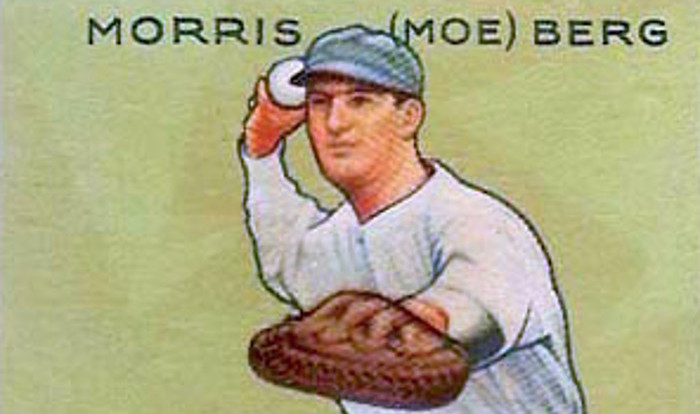
Moe Berg earned his reputation as the brainiest man in baseball — he had two Ivy League degrees and studied at the Sorbonne. But when World War II broke out he found an unlikely second career, as a spy trying to prevent the Nazis from getting an atomic bomb. In this week’s episode of the Futility Closet podcast we’ll follow Berg’s enigmatic life and its strange conclusion.
We’ll also consider the value of stripes and puzzle over a fateful accident.
Intro:
Johann David Steingruber devised floor plans in the shapes of letters.
At least six of Felix Mendelssohn’s songs were written by his sister Fanny.
Sources for our feature on Moe Berg:
Nicholas Dawidoff, The Catcher Was a Spy, 1994.
Louis Kaufman, Barbara Fitzgerald, and Tom Sewell, Moe Berg: Athlete, Scholar, Spy, 1996.
W. Thomas Smith, Encyclopedia of the Central Intelligence Agency, 2003.
Glenn P. Hastedt, Spies, Wiretaps, and Secret Operations: An Encyclopedia of American Espionage, 2011.
Nicholas Dawidoff, “The Fabled Moe,” American Scholar 63:3 (Summer 1994), 433-439.
Alan Owen Patterson, “The Eastern European Jewish Immigrant Experience With Baseball in the Late Nineteenth and Early Twentieth Century,” Modern Judaism 28:1 (February 2008), 79-104.
“Morris ‘Moe’ Berg,” Atomic Heritage Foundation (accessed Feb. 3, 2019).
“‘Moe’ Berg: Sportsman, Scholar, Spy,” Central Intelligence Agency, Jan. 17, 2013.
Richard Sandomir, “Baseball Hall of Fame to Celebrate a Catcher (and a Spy),” New York Times, July 30, 2018.
Bruce Fretts, “Who Was Moe Berg? A Spy, a Big-League Catcher and an Enigma,” New York Times, June 21, 2018.
Josh Pollick, “Moe Berg — OK Player, Outstanding Individual,” Jerusalem Post, Dec. 30, 2004, 11.
“To Be a Spook,” Justin Ewers, et al., U.S. News & World Report 134:3 (Jan. 27, 2003).
Hal Bock, “A Catcher and a Spy — Journeyman Backstop Was an Operative During WWII — Moe Berg,” Associated Press, June 25, 2000.
Paul Schwartz, “Classic Look at Moe Berg, Catcher & Spy,” New York Post, June 21, 2000, 68.
“An Abstruse Topic Saved His Life,” New York Times, March 21, 2000.
Steve Bailey, “Moe Berg’s Legacy,” Boston Globe, Oct. 6, 1999, D1.
Jonathan Wasserman, “The Enigmatic Life of Moe Berg,” Jewish Advocate, Sept. 29, 1994, 1.
Louis Jay Herman, “‘To Hell With Moe Berg!’,” New York Times, Aug. 14, 1994.
David A. Hollinger, “How Uncertain Was He?”, New York Times, March 14, 1993.
Christopher Lehmann-Haupt, “Books of the Times: Did a German Scientist Prevent Catastrophe in World War II?,” New York Times, March 8, 1993.
William J. Broad, “New Book Says U.S. Plotted to Kill Top Nazi Scientist,” New York Times, Feb. 28, 1993.
Ira Berkow, “Sports of the Times; The Catcher Was Highly Mysterious,” New York Times, Dec. 14, 1989.
Bernard Kogan, “Baseball Anecdotes,” New York Times, June 4, 1989.
William Klein, “The Spy Who Came in From the Diamond,” New York Times, Dec. 1, 1985.
Moe Berg, “Baseball: What It’s All About,” New York Times, April 13, 1975.
Jonathan Schwartz, “Catcher Magna Cum Laude,” New York Times, March 30, 1975.
Dave Anderson, “Mysterious Moe Is De-Classified,” New York Times, Jan. 28, 1975.
“Moe Berg, a Catcher in Majors Who Spoke 10 Languages, Dead,” New York Times, June 1, 1972.
Arthur Daley, “Sports of the Times,” New York Times, June 1, 1972.
Whitney Martin, “‘Mysterious’ Berg Well Equipped for Place of Latin Ambassador,” Wilmington [N.C.] Morning Star, Jan. 17, 1942, 6.
“Moe Berg, Red Sox, Gets Job as Envoy,” New York Times, Jan. 15, 1942.
Richard McCann, “Baseball’s One-Man Brain Trust,” [Washington D.C.] Evening Star, May 21, 1939, 11.
Tom Doerer, “Nationals Hire Berg as Manush Signs,” [Washington D.C.] Evening Star, March 10, 1932, D-1.
“Moe Berg Attracts Schalk as Catcher,” Norwalk [Conn.] Hour, Dec. 14, 1927, 17.
“Veteran Scott Will Start at Short for White Sox,” [St. Petersburg, Fla.] Evening Independent, March 24, 1926.
“White Sox Get Moe Berg,” New York Times, Sept. 16, 1925.
Listener mail:
Wikipedia, “This Is Your Life (UK TV series)” (accessed Feb. 5, 2019).
Wikipedia, “This Is Your Life“ (accessed Feb. 9, 2019).
“Group Captain Sir Douglas BADER CBE, DSO, DFC, FRAeS, DL,” Big Red Book (accessed Feb. 9, 2019).
Douglas Bader on This Is Your Life.
Dick Cavett, “Can You Stand Some More Stan?” New York Times, Oct. 5, 2012.
Wikipedia, “Horse-Flies as Disease Vectors” (accessed Jan. 16, 2019).
Gábor Horváth, Ádám Pereszlényi, Susanne Åkesson, and György Kriska, “Striped Bodypainting Protects Against Horseflies,” Royal Society Open Science 6:1 (Jan. 2, 2019).
This week’s lateral thinking puzzle was contributed by listener Manon Molliere. Here’s a corroborating link (warning — this spoils the puzzle).
You can listen using the player above, download this episode directly, or subscribe on Google Podcasts, on Apple Podcasts, or via the RSS feed at https://futilitycloset.libsyn.com/rss.
Please consider becoming a patron of Futility Closet — you can choose the amount you want to pledge, and we’ve set up some rewards to help thank you for your support. You can also make a one-time donation on the Support Us page of the Futility Closet website.
Many thanks to Doug Ross for the music in this episode.
If you have any questions or comments you can reach us at podcast@futilitycloset.com. Thanks for listening!
